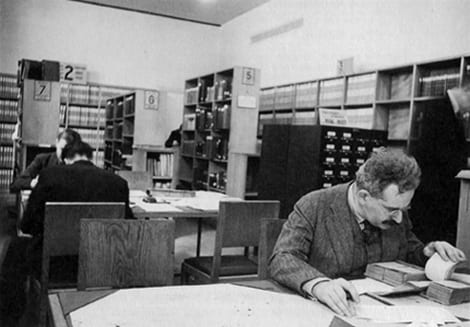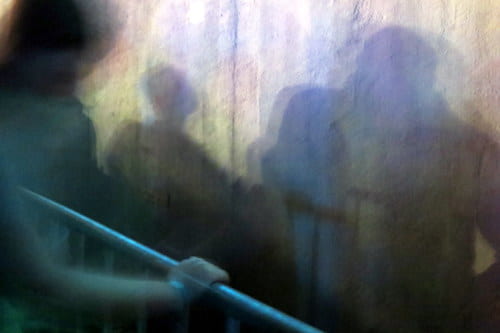By Juliane Baruck
Discrimination, excessive force, fatal assaults—is police violence a problem that can be explained by reference to the proverbial ‘bad apples’? For the philosophers Walter Benjamin and Jacques Derrida, it points to deeper, structural causes: the contradictory constitutional logic of the police as an institution. Benjamin’s essay Critique of Violence [Zur Kritik der Gewalt] from 1921 is shaped by the experience of World War I and the violent postwar period that saw the strengthening of military and police forces at the end of the November Revolution and the political clashes of the Weimar Republic. Written seventy years later in 1991, Derrida’s lecture Force of Law, by contrast, marks a reflection on the Cold War with its proliferation of anti-democratic and terrorist forces. Despite the distinct historical backgrounds they reflect on, however, both thinkers use the example of the police in the modern-nation state to reveal the structure of law as mythical—as something that is not naturally given. Rereading their texts on law and violence together, I propose, can help interpret the structural position of the police within the modern state apparatus and contextualize the persistence of systemic police violence beyond individual transgressions.
On a basic level, the police constitute the means of the state to exercise, enforce, observe, and safeguard the legal order. As an institution, they establish the binding nature of legal norms and uphold the state’s sovereignty. In other words, the relationship between law and police is that of means and ends; the police (as the means) are legitimized by the law (the ends) to exercise violence for the purpose of the latter’s preservation. In reality, however, it quickly becomes clear that the police often fail to fulfill their function as a mere means of upholding the law, and that turning to or even against them is simply not an option for many people.
Walter Benjamin addresses this peculiar position of the modern state police in his Critique of Violence. Notorious for being inimical to English translation, the essay deliberately exploits the ambiguity of the German term Gewalt, which can be translated as both violence and legitimate power, to illustrate that the logic of law is always already accompanied by violence. Attributing to the police the status of a “spectral mixture,” Benjamin argues that the police’s power exceeds that of a law-preserving institution because it can set its own ends. The police, in Benjamin’s terms, hold both law-preserving and law-making power (Gewalt). While the former grants the police the right to act in order to pursue legal ends (the “right of disposition”), the latter provides them with the right to “decide these ends within wide limits”—and the police thus also possess the “right of decree.” (242) For Benjamin, exactly this entanglement between law-making and law-preserving power (Gewalt) constitutes the “ignominy” (242) of the police.

However, the systematic connection between these two forms of police power often remains concealed. The police’s room to pursue self-imposed ends is to a certain extent limited, as it is restricted by the specific legal system within which the police operate and the vagueness of which they have to exploit. Within this vagueness, police law finds its legitimized place:
Rather the ‘law’ of the police really marks the point at which the state, whether from impotence or because of the immanent connections within any legal system, can no longer guarantee through the legal system the empirical ends that it desires at any price to attain. Therefore, the police intervene ‘for security reasons’ in countless cases where no clear legal situation exists […]
Benjamin, Critique of Violence, 243
Hence, the vaguer the legal system is, the more room for interpretation it allows, and it consequently becomes easier for the police to disguise their actions as the mere exercise of law. In fact, this ambiguous space within the law requires the police to set themselves ends that, on a structural level, differ from the ends of the legal system. In this constellation, Benjamin argues, the police can easily set themselves ends that are “without the slightest relation to legal ends,” while they are “accompanying the citizen as a brutal encumbrance through a life regulated by ordinances, or simply supervising him.” (243) For Benjamin, the police thus have relative autonomy of action, especially in those cases where the state has no special laws to protect specific groups or regulate distinct situations. Extending the powers of police in states of emergency or crisis further increases the scope for police intervention. For example, when the police during protests are sent out to ‘calm down the demonstrations’ and ‘secure the city,’ there is no real legal framework detailing the exact actions that are implied in such an order.
According to Benjamin, the ignominy that marks the authority of the police arises from the fact that they are exempt from providing any grounds on which they could justify the exercise of both powers (Gewalten). Law-making power is usually “required to prove its worth in victory” (243), i.e. by defeating the enemy the winner gains the legitimacy necessary in order to establish a new legal order. The police’s authority, by contrast, is always-already legitimized by the existing legal system. And while law-preserving power typically “may not set itself new ends” (243), the police are also exempt from this condition because they are authorized by the state to do precisely that. The traditional separation of the two powers (Gewalten) is thus clearly suspended in the case of the police: “Its power is formless, like its nowhere-tangible, all-pervasive, ghostly presence in the life of civilized states” (243). This ghostly nature results from the police’s ability to not only apply, interpret, and change laws, but also to present their violations of the law as supposedly lawful. Because the police are not policed themselves and their limits of action remain necessarily blurry, they turn into an abstract and continuously present object of fear. In sum, the institution’s capacity structurally transgresses the framework of legitimacy that a legal system considers appropriate for preserving itself.
This transgression, in turn, has three far-reaching, structurally related consequences in Benjamin’s reading. First, the police forfeit their a priori legitimacy as a means of maintaining the law. As they exercise both law-preserving and law-making power (Gewalt), they systematically cannot be legitimized by the law itself. It is therefore precisely the empowerment of the police to act autonomously along certain lines that leads to the transgression of a legal structure meant to legitimize the institution of the police as a necessary means to attain certain legal ends. As a result, by exceeding the mere function of preserving the law, the police’s relationship to the law becomes one of consubstantiality, as succinctly put by Daniel Loick in his recent reading of Benjamin (119).
Second, in its dependence on the police, which is the consequence of its inability to ground its validity in itself, the law is exposed as arbitrary, or mythical. For Benjamin, this renders visible the violence (Gewalt) that is inherent in every act of law-making: The legal order itself is not naturally given but arbitrarily imposed, manifested or forced upon a state. Hence, Benjamin describes this kind of arbitrary necessity, which exists structurally in every legal system, as the “mythic manifestation of immediate violence” (249). What constitutes the fateful character of this mythical violence is that the legal order decides on the justification of means, and thus ultimately on all violence. (248) Because its ultimate end is the preservation of itself, that fateful, arbitrarily-necessary law seeks to monopolize all violence in itself. (239) Any other, i.e. external violence, whether individual or collective, poses a threat to the law not (only) in its particular form as a distinct statute, but to the law as such. Thus, the law exists in a permanent state of fear vis-à-vis any other violence because of the latter’s inherent law-making capacity and, consequently, its potential to entirely overturn the existing order. (239) The monopolization of all violence within the law implies that police violence, in turn, can simply be covered up as a defense of the law.
The subsequent third outcome is that the police pose a fundamental threat to the sovereignty of the law. The police, in their capacity to assert their own sovereignty, always pose a threat to the state. This finding, then, undermines the rule of law as a legitimate end. In other words, as argued by Loick, the conflation of law-making and law-preserving power (Gewalt) in the police must result in a contradiction: the police are instantiated to preserve the law while at the same time, in their capacity as law-making power, they pose an immediate threat to that same law. (116-17) Although the autonomy of the police is initially restricted by the law, it is, as Benjamin argues, precisely the necessity to apply laws and to interpret and decide “where no clear legal situation exists” (243) that provides the condition of possibility for the police to turn against the state as the framework of their legitimization—above all because their actions are taking place in the present, while the establishment of law necessarily precedes this present.
For Jacques Derrida, who built upon Benjamin’s essay in his lecture Force of Law, it is this third consequence that exposes the fundamental character of the law: it always contains a threat to itself. Following Benjamin, Derrida posits that the law cannot be grounded in or justified by itself; any attempt to do so must inevitably be condemned as “legitimate fiction” (12), as something that presents itself as a naturally given and thus ultimately legitimate in a Platonic sense. Yet, while Benjamin is concerned with illustrating the impossibility of providing legal legitimacy to the police, Derrida turns this argument around and contends that the existence of the police necessarily follows from the law’s lack of legitimacy: “By definition, the police are present or represented everywhere that there is force of law.” (44) This leads him to deduce that “[t]hat which threatens law already belongs to it, […] to the origin of the law”. (35) In other words, Derrida assumes that, because law is never able to be grounded in an absolute truth but instead develops in a process of mutual influence with the contingencies of history and the historical understanding of justice, the possibility of its self-destruction is inscribed in every law—precisely because of its contingency. The police, then, are the very instance of the law that enables it, by applying and thus iterating it.

According to Derrida, rules in the sense of the law are only valid when they are enforceable. Thus, the existence of laws is conditioned by the possibility of their enforcement. (6) The mixture of law-preserving and law-making violence evident in the police thus draws attention to a central aspect of the law, which can be described as auto-deconstructive.
What threatens the rigor of the distinction between the two types of violence is at bottom the paradox of iterability. Iterability requires the origin to repeat itself originarily, to alter itself so as to have the value of origin, that is, to conserve itself. Right away there are police and the police legislate, not content to enforce a law that would have had no force before the police.
Derrida, Force of Law, 43
The institution of the police paradigmatically reveals that the establishment of a law always implies its preservation in a form that requires an iterated foundation. Already in the act of foundation, the law “inscribes the possibility of repetition at the heart of the originary.” (38) Consequently, in Derrida’s understanding, there is no more “a pure founding violence, than there is a purely conservative violence.” (38) Every law contains a re-founding, “so that it can conserve what it claims to found.” (38) Here, Derrida adopts from Benjamin the aspect of the circular self-weakening of the law-making by the law-preserving power (Gewalt) (cf. 55; 251).
This means, however, that for Derrida, the threat to sovereignty does not come from outside, i.e. from the police as an independent, autonomous force in opposition to the law. Rather, the police illustrate a fundamental and constitutive element of every law: the necessity of its re-founding always implies the possibility of its own destruction. And vice versa, this possibility of the destruction of the law is the motor of its constant self-authorization, of its continuation. This circumstance fundamentally enables the structural facilitation and disguise of police violence (Gewalt), since the police act to enforce a law and, by refounding it over and over again, legitimize it. Being this refounding force, the police structurally reach beyond the law.
What follows from Benjamin’s and Derrida’s thoughts on the police? Both essentially argue that law has a mythical origin, that there is no absolute law that could claim universal validity. By emphasizing the ghostly presence of the police, and their mixing of law-preserving and law-making powers (Gewalten), Benjamin is particularly concerned with showing that it is impossible to legitimize violence (Gewalt) as a means of preserving the law, and thus aims to expose the violence (Gewalt) that is implicit in any legislation. Analyzing this same fundamental lack of legitimation of the law, Derrida argues that the police reveal the threat of destruction inherent in every law, precisely because of the impossibility of its self-legitimation. Ultimately, it is this legitimation that is, and will continue to be, the task of law.
In conclusion, police violence is legitimized by the structural coupling of law with the police, which themselves lack any firm legitimation. Therefore, for both Benjamin and Derrida, the danger is not that individual police officers become criminals, as police violence is not external to the police’s existence as a means. Rather, they indicate a structural problem that is rooted in the very constitution of the police: by means of a legitimate fiction, the police are legitimized by a law that they themselves must uphold. This contradiction cannot be resolved.
Juliane Baruck is a graduate student and research assistant in the Department of Philosophy at the Freie Universität Berlin. Her current research focuses on Political Critical Theory and particularly on the intersection between democracy, justice, and responsibility.
Featured Image: “phantom (cc)” by Martin Fisch, licensed under CC BY 2.0.




January 14, 2022 at 10:33 pm
This was brilliant. Thank you for sharing.